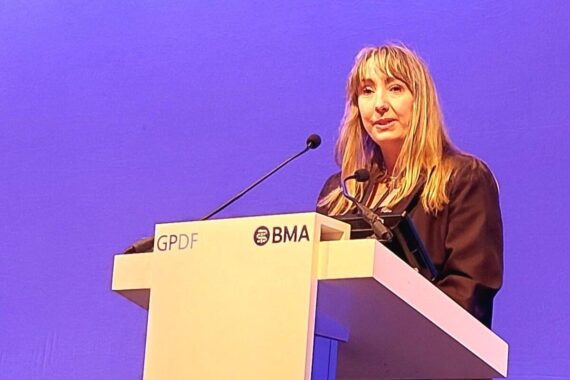LMCs demand new contractual measures for continuity of care in tight vote

GP leaders at the UK LMC Conference have backed a motion proposing there should be contractual measures to incentivise continuity of care by 111 votes to 110.
The motion, debated today in Newport, Wales, called on the GPC and RCGP to ‘collaborate’ to develop tools for measuring continuity of care and ‘develop possible contractual solutions’.
The motion said there could be contractual ‘payments to general practice teams for work that supports continuity of care’.
It added that the proposal would be ‘for each devolved nation to debate and adopt if appropriate’.
However, there were a number of speakers against the motion, with many GPs stating that introducing more measurements into general practice would make life harder.
Dr Samanta Fenwick (pictured), from Grampian LMC, proposing the motion, said: ‘There is a risk with this motion that governments will weaponize contractual payments for continuity of care by advising patients have the right to see the GP for all appointments. The research has shown this is not achievable or required to achieve the benefits.’
Also speaking in favour of the motion, Dr Austin Nichol, from Glasgow LMC, said: ‘I think it would give us value, and empower me to really improve the continuity of care that I would provide, as long as it doesn’t distract from core funding of GMS.
‘I think our core funding has continuity at its heart. That’s where the money should be going into and should be an addition.’
But speaking against the motion, Dr Pranav Lakhani, from Liverpool LMC, said: ‘We should not be looking to introduce new processes that measure things in primary care. We should not be proposing new contractual amendments with payments attached to certain activities. We already have enough of those. This is counterproductive and it increases bureaucracy.’
Dr Francesca Frame, from Cambridgeshire LMC, said: ‘My concern is not about the sentiment of the motion, but about what this motion will do if passed.
‘As several of the previous speakers have already mentioned, by passing this motion we’re mandating our GPC colleagues to be bounded by its wording. We’re tying them down to work on a specific tool.
‘We want to empower our GPC colleagues to have the freedom to work on ways of integrating continuity of care into our contracts and we know that one size never fits all.’
Recent studies have shown more GPs and patient continuity may increase life expectancy, while the inverse increases mortality for several chronic conditions.
Continuity of care motion
That conference believes in the value of appropriate continuity of care and calls on GPC UK and RCGP to collaborate on tools for measuring continuity and develop possible contractual solutions that provides payments to general practice teams for work that supports continuity of care for each devolved nation to debate and adopt if appropriate. CARRIED 111 to 110
The conference also voted on funding uplifts to be linked to inflation. The motion, which demanded ‘that GP contracts provide for an automatic uplift in funding to cover inflationary pressures’, was carried overwhelmingly.
This should be ‘along similar lines as the state pension “triple lock”, including but not limited to pay recommendations issued by DDRB and/or government, changes to the National Living Wage, and increases in practice running costs’, it added.
Dr Tona Fernandez, from Ayrshire and Arran LMC, proposing the motion, said: ‘We need a plan to refocus health to primary and community care. We need to secure sustainable funding for primary care teams. In Scotland, practices have reported that they do not have sufficient funds to replace outgoing staff and we are aware of similar choices across the other four nations. Personally, I’d like to recruit some admin staff and give them the same pay and conditions or better and other sectors of the NHS.’
Dr Reyad Kabir, a GP and PCN clinical director from Hampshire and Isle of Wight LMC, said: ‘I was in a meeting last week and one of the GP partners mentioned that this this month, they haven’t managed to pay their partners because they had to the uplift staff salaries.’
The RCGP has called on the Government to ‘radically’ reform GP funding in England, highlighting that the current Carr-Hill formula disadvantages patients in poorer areas.
They argued that GP practices in areas of ‘greatest deprivation’ do not receive ‘proportional funding’ to address more ‘complex needs’, and urged the DHSC to reform the Carr-Hill formula.
Inflationary measures motion
That conference is deeply concerned about the ongoing failure by governments to adequately invest in general practice services, as highlighted by the Kings Fund Report of February 2024, and:
(i) calls for a recognition and public acknowledgement of the impact that this is having on our patients’ ability to access GP services CARRIED UNANIMOUSLY
(ii) believes that the current system of adjusted GP capitation payments has failed to account for demand and activity per patient over the years CARRIED UNANIMOUSLY
(iii) condemns the approach of investing into short-term piecemeal schemes, with complex funding systems, which has prevented long-term planning and investment into the general practice workforce CARRIED UNANIMOUSLY
(iv) instructs the GPCs to determine what ‘reasonable provision’ means in terms of the funding we are given to deliver GMS CARRIED
(v) demands that GP contracts provide for an automatic uplift in funding to cover inflationary pressures, along similar lines as the state pension “triple lock”, including but not limited to pay recommendations issued by DDRB and / or government, changes to the National Living Wage, and increases in practice running costs. CARRIED OVERWHELMINGLY









